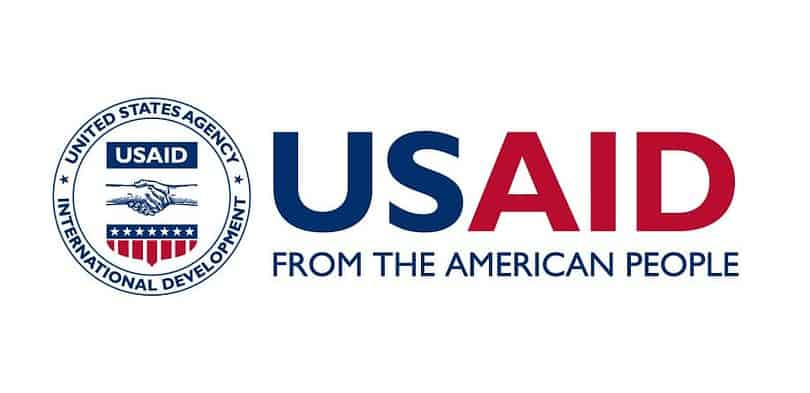MR. CAPEHART: Loosst d'grouss Bild ufänken. Wéi a wéi eng Aart a Weis sinn Fraen disproportional vum Klimawandel betraff?
ADMINISTRATEUR POWER: Gutt, als éischt, loosst mech déi vun iech Merci soen, déi dëst Evenement setzen.
A sot just dat ass meng 10. UNGA - nee, meng 11. UNGA an dat ass déi éischte Kéier datt ech an engem Event wéi dëst war, wat just eng grouss Quell vu ville Probleemer an enger grousser Noutwennegkeet a Saache Léisunge hëlt .
Also ech géif als éischt soen, Frae sinn, wéi all marginaliséiert Persounen, all vulnérabel Populatiounen éischter, disproportional vum Klimawandel betraff. Mir gesinn et a Minoritéitsgemeinschaften hei am Land ëmmer erëm. Mir gesinn et iwwerall op der Welt spillt.
Wann Dir déi aktuell Afferraten oder Doudesraten an natierlechen Noutfäll kuckt, da gesitt Dir Fraen a Kanner déi de Brunt droen. An Dir mengt vläicht, oh, gutt, dat ass e biologeschen Ënnerscheed a vläicht kënne se d'Gezäitewellen net iwwerwannen oder wat och ëmmer.
Awer et ass vill iwwer Geschlechtnormen a sief et, d'Gefill datt Dir Erlaabnis brauch fir ze wëssen ob Dir kënnt verloossen an an Haiser agespaart sinn. Et ass am Allgemengen, just tatsächlech verantwortlech fir sou vill wat d'Wuel vun der Famill ugeet. An erëm net an der Positioun sinn, säin eegene Wuel ganz prominent ze stellen.
Dir gesitt et all Dag, d'Schwächheeten, wéi d'Waasser dréchent, an ech war just op sou vill Plazen - ech si sécher och vill vun Iech - wou et just vu Joer zu Joer esou staark ass, wéi anescht sinn d'Landschaften wéi déi viru just zéng Joer. Awer eng Saach huet sech net sou vill geännert, dat ass d'Norm, datt et d'Fraen sinn, déi d'Waasser an de ländleche Gemengen sammelen, sou datt d'Waasser bei der Gemeng dréchent, d'Frae mussen ëmmer méi wäit goen.
An dat war selbstverständlech e schrecklecht Mëttel, duerch deen, oder Wee duerch deen, Fraen ënnerwee kontinuéierlech geschlechtsbaséiert Gewalt ausgesat goufen. Also wat Dir méi wäit geet, wat Dir manner Schutz hutt, wat méi déi aner Normen déi net op hirem Gesiicht schéngen sou vill mam Klimawandel ze dinn ze hunn - eng Norm déi beweist datt et an der Rei ass eng Fra ze iwwerfalen oder ze attackéieren – déi Norm sech dann duerchschnëttlech a bedeit also nees en disparate Impakt op d’Fraen an deem Secteur.
MR. CAPEHART: Also wou op der Welt sinn dës Themen am akutsten?
ADMINISTRATEUR POWER: Gutt, et ass schwéier ze wielen. Ech ginn Iech just e bëssen e kuerzen Tour vu mengem rezenten Horizont, oder wat och ëmmer d'Réckversioun vun engem Horizont ass.
Am leschte Joer sinn ech a Pakistan gereest wann en Drëttel vum Land ënner Waasser war wéinst enger Kombinatioun vun onendleche Reen a Schmelze Gletscher - op eemol kollidéieren - an inadequater Virbereedung an Infrastruktur. An erëm sinn et Fraen dacks, déi lescht bleiwen fir Immobilie ze schützen, Béischten ze schützen wéi Männer op der Sich no Hëllef goen. Ech mengen, jiddereen ass op schrecklech Manéier betraff.
Vun do aus, dann, an den nërdlechen Kenia an op Somalia ze reesen fir fënnef direkt gescheitert verreenten Saisonen ze gesinn. Also de komplette Géigendeel vun deem wat ech a Pakistan gesinn hunn, dat ass just gedrockt Land. Millioune Véi stierwen un der Dréchent am Horn vun Afrika. Dir mengt vläicht, gutt, den Haapteffekt wäert op d'Pastoralisten sinn, dat sinn natierlech d'Leit, déi d'Béischten erzéien.
A sécher, Dir hutt tatsächlech e grousse Spike bei de Suizid vun dëse Männer gesinn, well si zënter Joerdausend Déieren erhiewen an op eemol hir ganz Geessen oder Kamelen esou ausgeläscht goufen.
Awer wann et drëm geet d'Auswierkunge op d'Familljen ze managen an déi schwéier akut Ënnerernährung, déi jonk Leit hannerlooss hunn, besonnesch Kanner ënner fënnef, et waren d'Fraen, déi souwuel mat verzweifelte Mann ze dinn hunn, mat der Fro ze këmmeren, wat vu Jongen gëtt, déi virgestallt, datt de Liewensstil weidergeet an elo op eemol denken: "Wéi ginn ech hinnen eventuell en alternativt Liewen, eng alternativ Vocatioun," mä dann och an der Positioun ze probéieren Liewensmëttel fir déi Klengst ze fannen.
Also ech mengen, erëm, et trefft op verschiddene Plazen. Ech war just, déi lescht ech Iech bidden ass, Ech war just zu Fidschi.
An natierlech, fir all Pazifik Inselen - et ass bal all vun hinnen - ass et eng existenziell Bedrohung.
Et geet dorëms, datt ganz Nationalitéiten an enger Rei vu Joere mussen erausfannen, wou se plënneren, wat se maachen, wéi wann se an den Deeler vum Land, besonnesch op Inselen, liewen, déi esou niddereg leien.
A just kleng Beispiller mat, wou Fraen do eraus sinn, wuessen Industrie.
An dësem Fall hunn ech mat enger Fra mat enger Grupp vu Frae begéint, déi Mier Drauwe ugebaut hunn - déi iwwregens lecker sinn.
Ech hat ni Mier Drauwe virun. A si waren esou houfreg op hir Mier Drauwe. An, USAID probéiert se z'ënnerstëtzen, e Mikroprêt ze kréien fir datt se hiert Geschäft kënne bauen, hire Geschäft wuessen.
Awer just iwwregens, an hei kënnt de Klimawandel just op all Kéier op.
Si soen, gutt, deen eenzege Problem dës Deeg ass, datt mir elo eis Schëffer weider a méi eraus mussen huelen, well wéi den Ozean waarm gëtt, gëtt et besonnesch no beim Ufer, also musse mir méi wäit goen. Also gi mir méi wäit fir eis Mier Drauwe ze kréien, dat heescht vill méi laang ewech vun all deenen aneren Obligatiounen, déi mir als Fra am Stot hunn.
Ausserdeem benotze mir Schëffer, déi mat Brennstoff ugedriwwe ginn, sou datt mir méi Emissiounen an d'Loft setzen, wéi mir goen a probéieren dës Mier Drauwe zréckzekommen fir eis Geschäfter ze wuessen.
Also, Dir wësst, erëm, iwwerall wou Dir kuckt, Pazifik Inselen, Afrika, Asien - et ass walloping Communautéiten.
MR. CAPEHART: Ech wëll op Är ernimmt Mikroprêten kommen, ech wëll op d'Hëllef kommen déi d'USAID gëtt. Awer sinn dës Themen iwwer déi Dir just schwätzt, dat ass vill vun den Entwécklungslänner, awer ass dat wat mir schwätzen, limitéiert op d'Entwécklungswelt?
ADMINISTRATEUR POWER: Nee, kaum, awer ech passéieren just -
MR. CAPEHART: Dat nennt een eng féierend Fro.
ADMINISTRATEUR POWER: Mir liewen, ech mengen - mir sinn, mengen ech, op eiser Drëttenzwanzeger Naturkatastroph hei, déi elo iwwer eng Milliard Dollar an den USA kascht huet.
Mir hunn eisen wäermsten Dag, Woch, a Mount op Rekord erlieft, ech mengen just an de leschte puer Méint. Fir d'éischte Kéier hu mir verschidde Betriber, Summercampen a Méiglechkeete fir jonk Leit missen zoumaachen, well de Bëschbrandrauch an eist Liewen erweidert.
An erëm, déi ënnerschiddlech Auswierkungen. Dëst ass vläicht e klengt Beispill, awer wann e Kand net op de Camp ka goen, ass et déi schaffend Mamm - an de meeschte Stéit, sécherlech meng - déi muss erausfannen wat - et ass wéi eng Versioun vun deem wat geschitt ass mam COVID.
Wann d'Klima trefft, sief et op kleng oder flüchteg Manéier, déi schwéier gesondheetlech Auswierkungen a schwéiere Liewensstil Auswierkungen hunn, wäert et op d'Multitaskers vum Heem falen fir dat ze managen.
Awer, ech mengen, och just déi finanziell Auswierkunge vum Schued, deen elo gemaach gëtt, op wat wéi eng bal alldeeglech Basis fir e puer Deeler vun den USA fillt, kënnen net iwwerschätzt ginn.
Et geschitt just net wat d'USAID funktionnéiert well mir eis Aarbecht am Ausland maachen.
An eis Aarbecht, ech wäert soen, eng vun de gréissten Spannungen an Erausfuerderunge mat deenen mir kämpfen ass datt mir fixe Ressourcen a Ressourcen kréien, déi guer net mat den Entwécklungsschwieregkeeten halen, déi de Klimawandel verursaacht.
Och wa se wuessen, wuessen eis Ressourcen. Mee du kanns einfach net mathalen. Awer deen anere Problem ass net nëmmen dat. Et ass datt sou vill vun eise Ressourcen fir d'Leit an Noutverhältnisser lieweg ze halen wéi déi a Libyen just iwwer déi lescht Woch - oder déi, déi ech a Pakistan oder Somalia ernimmt hunn.
A wat Dir net géift maachen ass all déi humanitär Hëllef ze huelen an se amplaz an katastropheresistente Infrastrukturen oder an dréchentbeständeg Somen ze investéieren oder an deene Mikroprêten u kleng Baueren, déi tatsächlech fäeg sinn hir Smartphones ze benotzen fir extrem Wiederevenementer virzegoen an op d'mannst reduzéieren wat dës Verloschter sinn.
Also dat - wat ech beschriwwen hunn ass den Ënnerscheed tëscht Widderstandsfäegkeet an Nouthëllef. A mir si ganz gewiicht als Regierung an als Spendergemeinschaft schrëftlech grouss Richtung - ech mengen, et ass eng schéin Saach, et ass e schéine Privileg fir ze probéieren d'Leit ze hëllefen duerch déi schlëmmste Momenter vun hirem Liewen ze kommen.
Awer wann Dir et esou maacht, wat e ganz Stopp ass, wësst Dir datt Dir erëm do wäert sinn. An dat ass extra häerzzerräissend.
Well et fréier gesot huet, mir géife soen Klimaschock, awer elo ass et sou wéi, ass et e Schock wann et eng prévisibel Feature vun engem bestëmmten Deel vum Landwirtschaftsliewen ass? A wat verlaangt dat dann vun eis?
Wann de Kuch méi grouss wier, géife mir eis Investitiounen an d'Widderstandsfäegkeet dramatesch erhéijen, dat ass wat mir solle maachen. Et ass schwéier net Liewen ze retten am Interessi fir Liewen op laang Dauer ze retten. Also equilibréiere mir dëst sou gutt wéi méiglech. Awer et ass kee Spaass Balanceakt.
MR. CAPEHART: Dir hutt d'Fro virausgesot, déi ech géif stellen, sprangen aus dem Mikroprêt Stéck, also sprange ech vir. Loosst eis iwwer d'Relatioun tëscht wirtschaftlecher Entwécklung a Klimawandel schwätzen.
Wéi enk verbonne sinn dës Themen a wéi adresséiert d'USAID se béid zur selwechter Zäit?
ADMINISTRATEUR POWER: Gutt, ech mengen, ech géif soen, mir sinn an oder mir réckelen op, loosst mech soen, well mir hunn e laange Wee fir d'Opmierksamkeet op de Klimawandel als Design Feature vun all eiser Aarbecht ze integréieren.
Also eng Zort strukturell, vläicht wonky Beispill vun dësem ass datt mir eise Food Security and Resilience Bureau geholl hunn an et mat eisem Klimateam fusionéiert hunn. An dofir ass dat wou - awer den Nexus ass et ganz offensichtlech fir d'Leit ass net eng perfekt Iwwerlappung, awer et gëtt Tonne - d'Landwirtschaft ass eng grouss Emissiounsquell, sou datt dës Emissioune mussen erofkommen.
An natierlech wäert d'klimaschmart Landwirtschaft de Wee sinn, wéi mir d'Liewensmëttelsécherheet erhalen oder se an den nächste Joeren erhéijen. Also dat ass eng Fusioun. Awer wat d'Ausbildung ugeet, ass et d'Nummer eent. Ech mengen, eis all, jidderee vun eis, déi Kanner hunn, et ass déi Nummer eent Saach, déi Kanner iwwer eis wësse wëllen ass net nëmmen wat mat der Welt geschitt, déi ech weess, awer och wat kann ech doriwwer maachen?
Also och wann Dir un d'Ausbildung an der Gouvernance denkt - et ass sou grondsätzlech destabiliséierend fir Regierungen, déi de Klimawandel net mathale kënnen, egal ob op der Widderstandsfäegkeet oder op der Nout-Säit, well et dëse Verloscht vu Vertrauen an Institutiounen verbënnt, déi mir an esou gesinn. vill Deeler vun der Welt.
Dat ass net nëmmen iwwer den Export vun Iwwerwaachungstechnologien, Dir wësst, aus dem VRC oder Demokratien, déi mat anere Mëttelen ënner Attack sinn.
Et ginn och just Saachen, déi an der Welt geschéien, datt wann eng Regierung net mathale kann, et deen Zynismus iwwer Institutiounen verbënnt. Also dëst ass e laange Wee fir ze soen datt mir Gouvernance Aarbecht bei USAID maachen, mir maachen Ausbildung, mir maachen ëffentlech Gesondheet déi komplett mam Klima verbonnen ass.
Wann Dir d'Malariamuster verännert, virausgesot d'WHO, ech mengen, datt eng zousätzlech 250,000 Leit bis 2030 un de klimateschen Zesummenhang gestuerwe sinn - egal ob et Hëtztstress oder Malaria oder Waassermangel ass, Ënnerernährung déi dovunner wuessen.
Also wou mir als Agence musse kommen ass d'Opmierksamkeet op d'Widerstandsfäegkeet an d'Opmierksamkeet op de Klimawandel a wat et fir eng Gemeinschaft bedeit an alles wat mir maachen.
In a sense, USAID is a climate agency, even if we still have a climate team that works as a climate team per se, mainstreaming this agenda is what our missions are trying to do all around the world.
And this is not because I anticipate the, you know, the concerns of some maybe in our domestic politics on this – and I’m sure you’ll get there, but this isn’t USAID foisting anything.
This is the cri de coeur for you know, heard all around the world, that this is a game changer. Our development trajectories were going here – COVID hit and now we have what could feel like a COVID-like, not not of the same scale, but battering again and again and again.
So just as we’re now thinking differently about pandemic prevention, what should that lead us to think about when it comes to embedding climate in the mindset of all public spending and all notions of mobilizing, mobilizing private capital, because that’s, of course, going to be a big part of the solution.
So we’re that’s – it’s this mainstreaming and not having climate live over here. But given that it is this game changer and given it’s our host countries and the communities in which we work and of it works. It’s John F. Kennedy’s pleading gives us more of the tools to adapt to this shell-shocking phenomenon.
MR. CAPEHART: Well, I asked the question about economic development because, with economic development comes perhaps better lives, and better living conditions, which then can exacerbate the issues related to climate change.
So how do you – and I wrote it down really fast – that mainstreaming, how in mainstreaming climate in the things that you do. How do you find that balance between helping people help themselves, while at the same time not doing it in a way that exacerbates the climate problems that we all have to face?
ADMINISTRATEUR POWER: Yeah, and I mean, I think one example I think that you’re alluding to is, you know, as people get richer, they buy more meat and that causes, you know, more emissions or they travel more, they’re flying more there.
And absolutely, I mean, we’ve seen that the emissions trajectory in both the PRC and India reflected that.
Our emissions trajectory, back as we were bringing our economy online and modernizing, absolutely reflects that. So I think that is profound. I will say the fact that solar power, the cost of solar has come down by 85 percent. The cost of wind is down by 55 percent. Where we work, the demand signal for renewables is very, very significant – which doesn’t get it mediating some of the other features of getting wealthier.
But it does get to the urgency of making clean energy transitions as these prices come down. It is a better bet. And so again, when we have these exchanges on the Hill and it looks to some who are skeptical somehow still of climate programming, you know, that we’re bringing our green agenda to the countries in the communities we’re working in – no, it’s not like that at all.
They’re saying we can’t afford this other thing.
But actually, we can pop up a solar panel and have a water pump that we’ve been trying to get in this village. We can go off the grid in ways we never – where the state is not going to get here any time soon.
This was my experience out in Bekaa Valley in Lebanon, where USAID had worked to, you know, build a bunch of solar panels that powered electricity and ended up actually reducing tension between refugees who were being generously sheltered by Lebanese host communities, Syrian refugees, and the Lebanese.
Because they were no longer fighting over water because they had water because they had solar – but to attach to the grid, no way. And so then those tensions, who knows what would happen with that.
So the idea is that these investments are cost-effective over time, that actually you can develop, along the lines of what you’re describing, in a clean way.
I think the other aspects of consumption need to be dealt with as part of civic education and as part of norm work because it is true that in many, many societies, and again, including our own back in the day, as you increase your livelihoods, your income, consumables are a very attractive way to expand those new resources.
This feels like a high-class problem in most of the countries we’re talking about. I mean, I’m talking about working with small-scale farmers who are paying double this year for fertilizer than they were paying before Putin invaded Ukraine, who just need a little loan to be able to get access to some of those drought-resistant seeds that are going to increase yields by 25 percent.
But again, finding the resources to get them that. Getting the private sector interested in adaptation. But the question that we should be thinking now about, if we can be successful, if we can help them withstand the negative effects of climate change and the like here in America, grow jobs out of also these changes to their economies, then what?
Then we will be grappling with the kinds of things that have further fueled emissions in more recently developed countries.
MR. CAPEHART: As you alluded to many times, there’s a lot of good news related to the development of clean energy alternatives. That being said, though, global emissions once again hit a record high in 2022, and carbon dioxide in the atmosphere has risen to levels not seen in millions of years. Are we moving in the wrong direction despite glimmers of hope?
ADMINISTRATEUR POWER: Well, I mean, I think all of us can answer that question in two ways. And we talk to ourselves all day – on the one hand this, and on the other hand that. But what we can say is we’re certainly not moving fast enough. And you know what breaks my heart is, it’s a little bit like another version of the vicious cycle you were kind of describing.
But when you see the wildfires, and the rate of wildfires, and then all of the carbon emitted and all of the good that had been done with carbon emission reductions – and that being not washed away – whatever, smoked away, burned away – that’s heartbreaking because these investments are accelerating.
They are building momentum. So I think that, and that’s not the only thing that’s heartbreaking.
There’s so much that’s happening day to day and a little bit of the despondency, I think, setting in as well – as people just open the newspaper, and whether it’s in their own community or one further afield or even something like what happened in Libya, which just captures the imagination of, which was its own sui generis issue with regard to governance and infrastructure, but would not have happened that way but for the intensity of Storm Daniel, which is just being seen in so many communities.
But what I do think it’s important to come back to, at least as proof of concept, is that in Paris the projections – they were, we the world, were on a track to warm 4 degrees and we are now on a track to warm 2.5 degrees.
So that is a reflection of the agency that people have claimed over this trajectory. The problem is we need to curb warming at 1.5 degrees, but that delta from four to 2.5 should give people at least a sense that actually collectively we are doing things that are making a difference. There’s no doubt we are doing things that are making a difference.
If I could, though, I think the area that we have – I mean, as John Kerry likes to say, if we don’t get mitigation right and the carbon reductions right, there’ll be no planet to adapt. He makes a comment like that a lot.
We, at USAID, are in the mitigation and adaptation business, as is Secretary Kerry and his team. But I think in mitigation, what I think gives one hope is just how much the private sector has leaped in now recognizing that there’s money to be made. And I’d love to rely on people’s good intentions and their feeling of fellow humanity, but it’s much more reliable if they think there’s money to be made.
And that shift has occurred. And you see it in the IRA, which is already defying even the best projections and extrapolations that people did. I mean, this is going to have way more collateral effects and bring down carbon way more, I think, than people could have, just strictly speaking, anticipated because of a cascade now of private sector interest fueled and catalyzed by the underlying legislation.
And so too, as the prices come down again, there’s a virtuous cycle. Adaptation – we’re not we’re not there. And I don’t know if we’re ten years behind where we are on mitigation – where we are on mitigation.
Like it’s the same thing going to happen in ten years where we look back and say, oh, we lost all that time. Why couldn’t private-sector actors have seen as well that there’s good to be done and money to be made?
I guess if you have to think that way around the insurance industry in the agricultural sector, in Fintech, I mean, all these tools are going to be absolutely critical in particularly rural areas and those areas that are most vulnerable to climate change.
But about two percent of funding for adaptation comes from the private sector right now, and that has just got to change.
So President Biden and we have done a big call to action to the private sector, but it’s slow going. And even if you take – forget the specific sectors that have a direct nexus with the need to build resilience – look at it in even more stark terms. The market share that so many companies are hoping to capture is themselves going to have less money to spend, maybe in flight, maybe at war.
And so the positive of that is, hey, if we can help them adapt and be more resilient and where these emergencies happen, but don’t wallop communities in the same way and they bounce back, those are consumers that will be our consumers. But the negative is what if, you know, millions, tens of millions of consumers are taken offline because they are driven into poverty?
The predictions now are that 100 million more people driven into extreme poverty by 2030. But that’s within our hand, that adaptation. There’s so much less to, as I would say to my kids, there’s room to grow.
The areas that are the most troubling in some ways, there’s really room to grow. And you could see a cascade of the kind that we’ve seen on carbon mitigation.
MR. CAPEHART: Administrator Power, we got a minute and eight seconds and this will be the final question. The name of this conference is This is Climate: Women Leading the Charge. So how do you see women reshaping climate leadership?
ADMINISTRATEUR POWER: We, USAID, and Amazon, the company, not the forest, launched a gender equality fund, a gender equity fund at COP, and we launched it with $6 million in funding. And this is for women.
It’s for projects that will benefit women, it’s for projects that are driven by women in adaptation or in mitigation – the whole or the protection of natural ecosystems – but things broadly in the climate space.
And today we have the Visa Foundation and Reckitt, a company out of the United Kingdom, who have joined us and matched that initial – USAID put in $3 million, Amazon put in $3 million, and have added $6 million.
Why do I mention this? It’s not a huge amount of money yet. We are going to get up to $60 million, we hope, in rapid order.
This is part of another cascade that we would like to see. We’ve put out a request for proposals, incredible women leaders are putting proposals in.
These can be small projects. A lot of the climate finance right now is not going to small projects, it’s going to big international organizations. So working more with local partners is going to be absolutely key.
But these are going to be the success stories that are going to inspire people to invest more and to believe that change can come. And sadly, there are just not that many examples of climate finance facilities that are targeted and tailored toward women, even though women are bearing the greatest brunt.
And women, I think, in my experience, are doing the most innovative work in dealing with the consequences of climate change and trying to lower those consequences in the years ahead.
MR. CAPEHART: Samantha Power, the 19th Administrator of USAID, thank you very much for joining us today.
ADMINISTRATEUR POWER: Thanks, Jonathan.
What is USAID?
USAID stands for the United States Agency for International Development. It is an independent agency of the United States federal government that is primarily responsible for administering civilian foreign aid and development assistance. USAID’s mission is to promote economic and social development in countries around the world, with a particular focus on reducing poverty, promoting democracy, and addressing global challenges such as public health crises, environmental sustainability, and humanitarian crises.
Some of the key functions and activities of USAID include:
- Providing humanitarian assistance: USAID responds to natural disasters, conflicts, and other emergencies by providing humanitarian aid, including food, shelter, and medical supplies, to affected populations.
- Promoting economic development: USAID works to stimulate economic growth in developing countries by supporting projects and programs that create jobs, improve infrastructure, and foster private sector development.
- Supporting democracy and governance: USAID promotes democratic governance by providing technical assistance and support for fair and transparent elections, strengthening civil society organizations, and advocating for human rights and the rule of law.
- Advancing global health: USAID plays a crucial role in global health initiatives, including efforts to combat infectious diseases like HIV/AIDS, malaria, and COVID-19. It supports healthcare systems strengthening, family planning, and maternal and child health programs.
- Environmental sustainability: USAID works to address environmental challenges, including climate change and natural resource management, through projects that promote conservation, renewable energy, and sustainable agriculture.
- Education and capacity building: USAID invests in education and capacity-building programs to enhance the skills and knowledge of individuals and institutions in developing countries, thereby contributing to long-term development.
- Food security and agriculture: USAID supports programs aimed at improving food security, increasing agricultural productivity, and reducing hunger and malnutrition in vulnerable populations.
USAID operates in partnership with governments, non-governmental organizations, international organizations, and other stakeholders to achieve its development goals. It is often involved in projects and initiatives that aim to alleviate poverty, promote stability, and enhance the well-being of people in countries where it operates. The agency’s work is guided by the foreign policy objectives of the United States and the broader goal of fostering global development and progress.























